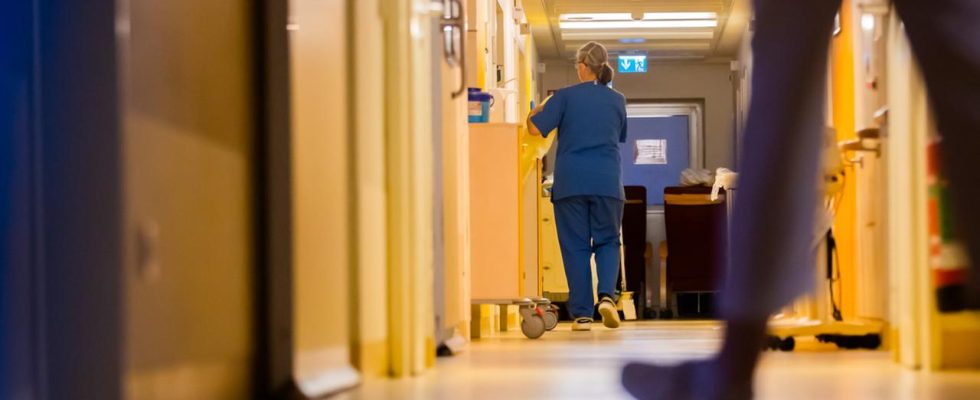The hospital reform should bring more specialization, but also make it easier for small clinics to survive. In the 80-bed Neuenbürg hospital, the decisions are viewed with mixed feelings.
The clinic has a view of the wooded heights of the Black Forest and is surrounded by a tranquil town of 8,000 people. The Neuenbürg hospital has just 80 beds and is therefore one of the hospitals that is following the hospital reform with particular attention.
A patient from the neighboring town of Straubenhardt, six kilometers away, is being treated in the emergency room. Sven Sickinger has a laceration on his head. Surgeon Judith Falter sews up the wound, medical director Stefan Sell has come to explain where the financial challenges lie for a small clinic like the one in Neuenbürg. “We have similar base costs as a large hospital, but far fewer patients,” he says.
2.1 million euros deficit
The relationship between the basic costs and the income from the treatment of patients is significantly less favourable. For 2023 they are planning a deficit of 2.1 million euros. There is no threat of closure, but one cannot go on like this for years.
Patients from the area appreciate their hospital around the corner. For example, because they can quickly get emergency care here. “As a result, I didn’t have to go to Karlsruhe or Pforzheim,” calculates patient Sickinger. “I’ll be there in five to ten minutes and it’s done very quickly.”
Will the hamster wheel turn even faster?
Especially small clinics like Stefan Sell’s should benefit from the hospital reform. So far, hospitals have mainly made money from the so-called flat-rates per case. And that means: The more patients you treat as quickly as possible, the better for the bottom line. Doctors therefore often talk about working in the hamster wheel. In the future, only part of the income will come from the flat-rate fees. Each clinic should also receive guaranteed basic funding – for technical equipment and staff that they have to provide in order to be able to offer certain services.
“That’s good, because it’s independent of performance, because then I have liquidity in the company,” says Jörg Martin, who heads the “Regionale Kliniken Holding” (RKH) clinic group, to which the Neuenbürg hospital belongs. He welcomes the reform, saying it is long overdue. “If 70 percent of the hospitals make a deficit, then it can’t just be the fault of the hospitals,” he is convinced. In principle, it is good that the flat rates per case should play a lesser role in the future.
The question, however, is how it will work in detail. Because the flat rates should be lowered. “So we get less per patient treatment. In the end, the hamster wheel could turn even faster,” warns Jörg Martin.
Waiting longer for surgeries?
In Neuenbürg they run along in the hamster wheel as best they can. Clinic boss Sell has long since done what the hospital reform wants: His hospital is concentrating on a special field, orthopedics and rheumatology. This also attracts patients from further afield, the operations are more routine and cheaper.
“Of course, specialization and routine also bring higher quality,” notes Verbund boss Martin. He therefore supports the plans. And also the idea of making it even more transparent in the future how well hospitals treat certain diseases. “We ourselves have been putting this information online for a long time, including treatment-related deaths.”
At the same time, however, more specialization means more options for operations that can be planned. “Longer waiting times are definitely possible,” predicts Jörg Martin. And he sees another problem: Specialist training is becoming increasingly difficult. “As a surgeon, for example, I have to gain experience. Not only with intestinal surgery, I also have to do an appendix or a hernia,” says Jörg Martin. “And in the future you will hardly find all of that in one house.”
In the RKH network, it may still be possible to organize this through stations in the various clinics. Other hospitals would have to cooperate more closely with each other in training than before.
No interest in healthy people
Some of what they offer in Neuenbürg simply doesn’t bring in any money. Klinikchef Sell has developed a training program to build muscle. Patients do it before an operation, it supports healing after the operation. But the clinic does not receive any money for the program via the flat rate per case. “We get the same amount for the operation, regardless of whether we offer the training or not,” Sell describes the problem.
If you want to solve this in principle, it would take a complete system change, says Martin, head of the association. At the moment you make money by treating sick people. The financing mechanism causes no interest in healthy people.
“How about if it were the other way around? If I make more money if people stay healthy than if they get sick?” Martin suggests. A fixed budget based on the population in the catchment area of a clinic is conceivable.
For now, however, Martin is happy that there was an agreement between the federal and state governments at all. “We urgently needed a decision to be able to plan.”

